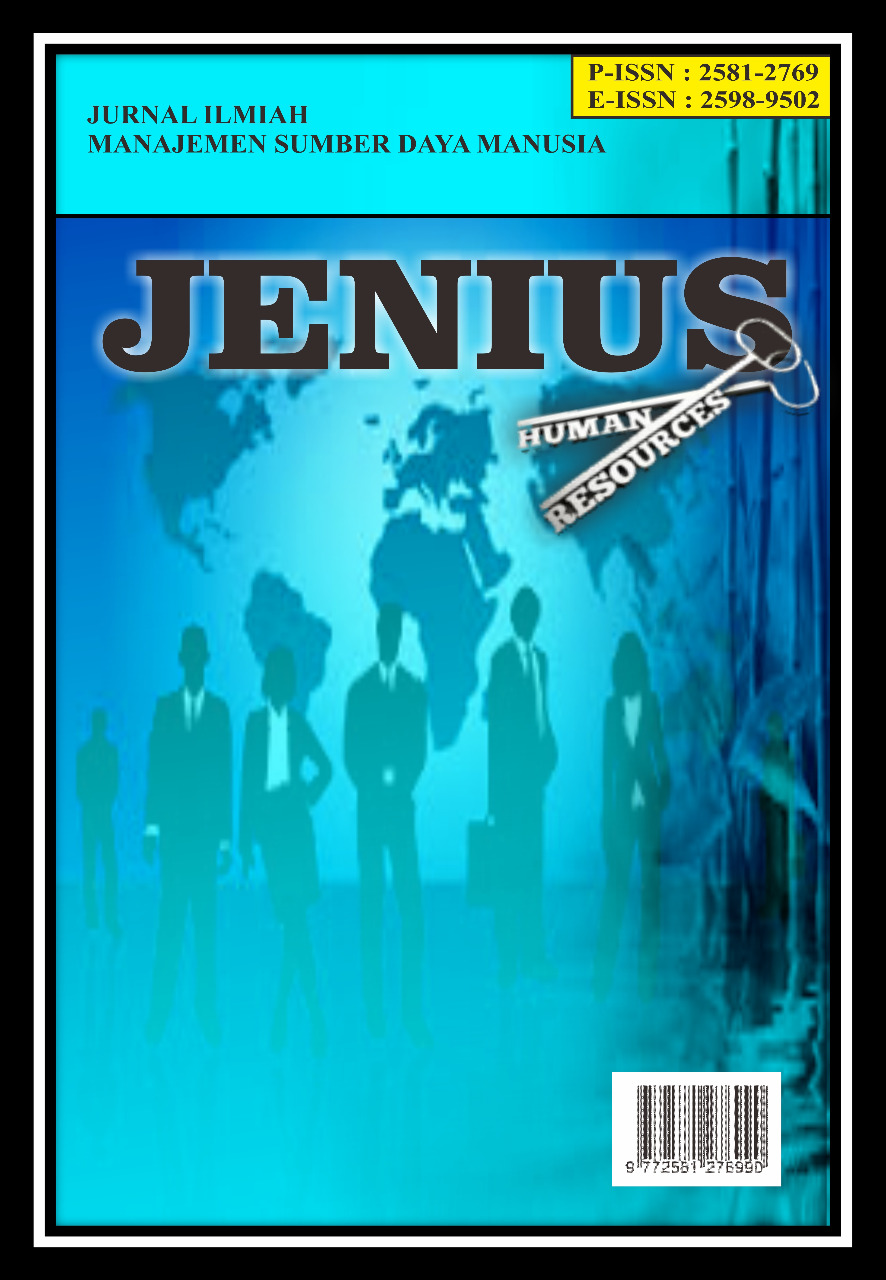Analysis of the Critical Role Of Organizational Culture in Improving Employee Performance
DOI:
https://doi.org/10.32493/JJSDM.v7i2.37699Keywords:
Organizational Culture, Social Responsibility, HIMA PPKnAbstract
This research aims to investigate the implementation of the role of organizational culture in strengthening the social responsibility attitudes of the management of the Political Science and Government Study Program Student Association (HIMA PPKn). Higher education has an important role in forming a young generation who has social awareness and responsibility towards society. In this context, student organizations such as HIMA PPKn can be an effective forum for training students in understanding and practicing their social responsibilities. This research uses qualitative methods with data collection techniques through in-depth interviews, observation and document analysis. The main respondents in this research were HIMA PPKn administrators who were active in organizational activities. The research results show that organizational culture plays a significant role in influencing the social responsibility attitudes of HIMA PPKn administrators. A strong organizational culture, which prioritizes values such as participation, cooperation, leadership and openness, encourages HIMA PPKn administrators to care more about social issues and be more actively involved in social activities outside the campus environment. The results of this research provide an important contribution to understanding the importance of organizational culture in the context of student organizations and how organizational culture can influence social responsibility attitudes. These findings can be the basis for developing more effective education and training programs to produce a younger generation who are more socially responsible and care about society. In addition, the results of this research can provide guidance for administrators of other student organizations in optimizing the role of organizational culture in strengthening their social responsibility attitudes.
References
Al Qusaeri, M. A., Khasbulloh, M. W., Mesra, R., & others. (2023). Pengaruh Budaya Organisasi Terhadap Inovasi Pada Perusahaan Teknologi: Studi Deskriptif Pada Startup XYZ Di Kota Bandung. Sanskara Manajemen Dan Bisnis, 1(03), 114–123.
Dhinantia, A. A., & Meilany, L. (2023). KOMUNIKASI ORGANISASI PELAYANAN SOSIAL DALAM ADMINISTRASI PEKERJAAN SOSIAL (STUDI KASUS TIM PARTNERSHIP DAN MARKETING INDONESIA MENGAJAR). Focus: Jurnal Pekerjaan Sosial, 6(1), 46–56.
Izzah, W. I. (2021). Pengaruh Stres Kerja dan Budaya Organisasi Terhadap Tingkat Turnover Intention Karyawan dengan Kepuasan Kerja Sebagai Variabel Mediasi (Studi pada Karyawan Rumah Makan Ayam Goreng Nelongso Cabang Malang).
Maduningtias, L., Narimawati, U., Affandi, A., Priadana, S., & Erlangga, H. (2022). Pengaruh Budaya Organisasi dan Kepemimpinan terhadap Kinerja Karyawan pada PT. Indomarco Pristama Kebayoran Lama. JIIP - Jurnal Ilmiah Ilmu Pendidikan, 5(4), 1206–1213. https://doi.org/10.54371/jiip.v5i4.547
Maulidiyah, N. N. (2020). Peran budaya organisasi dalam meningkatkan kepuasan kerja serta dampaknya terhadap kinerja karyawan Bank Indonesia. Jurnal Manajemen Bisnis, 17(2), 273–286.
Muspawi, M., Masita, M., & Swastini, S. (2023). Komunikasi Organisasi dan Motivasi. Jurnal Pendidikan Tambusai, 7(2), 7432–7440.
Mutropin, M., Riono, S. B., & Khojin, N. (2023). Pengaruh Budaya Organisasi, Komitmen Organisasi, dan Kepuasan Kerja terhadap Kinerja Karyawan (Studi Kasus di PT Bintang Indokarya Gemilang Brebes). JECMER: Journal of Economic, Management and Enterpreneurship Research, 1(3), 174–189.
Novziransyah, N. (2017). Pengaruh budaya organisasi terhadap kinerja karyawan PT. PLN (Persero) Kantor wilayah Sumatera Utara Medan. JUMANTIK (Jurnal Ilmiah Penelitian Kesehatan), 2(1), 14–25.
Putra, A. R., & Mardikaningsih, R. (2021). Kompensasi dan Lingkungan Kerja serta Pengaruhnya terhadap Komitmen Organisasi. Jurnal Ilmiah Edunomika, 6(1), 44–53.
Sinambela, E. A., Darmawan, D., & Mendrika, V. (2022). EFFECTIVENESS OF EFFORTS TO ESTABLISH QUALITY HUMAN. Journal of Marketing and Business Research, 2(1), 47–58. https://doi.org/10.56348/mark.v2i1.43
Sunarto, A. (2020). Pengembangan Sumber Daya Manusia dengan Berbasis Inovasi Untuk Menghadapi Revolusi Industri 4.0. Jurnal Ilmiah Manajemen, Ekonomi, & Akuntansi (MEA), 4(2), 397–407.
Wahyudi, A., Assyamiri, M. B. T., Al Aluf, W., Fadhillah, M. R., Yolanda, S., & Anshori, M. I. (2023). Dampak Transformasi Era Digital Terhadap Manajemen Sumber Daya Manusia. Jurnal Bintang Manajemen, 1(4), 99–111.
Downloads
Published
How to Cite
Issue
Section
License
Copyright (c) 2024 Yuli Wahyudi, Guruh Dwi Pratama, Sri Mulyani, Anggada Bayu Seta, Aruji Maswatu

This work is licensed under a Creative Commons Attribution 4.0 International License.
Authors who publish in this journal agree to the following terms:
The author owns the copyright of the article and assigns to the journal the right of first publication with the work simultaneously licensed under the terms Atribusi 4.0 Internasional (CC BY 4.0)
 which allows others to share the work with acknowledgment of the work's authorship and initial publication in this journal.
which allows others to share the work with acknowledgment of the work's authorship and initial publication in this journal.Authors may enter into separate additional contractual arrangements for the non-exclusive distribution of the published journal version of the work (for example, posting it to an institutional repository or publishing it in a book), with acknowledgment of the work's original publication in this journal.
Authors are permitted and encouraged to post their work online (for example, in institutional repositories or on their websites) before and during the submission process, as this can lead to productive exchanges, as well as earlier and larger citations of published work (See The Effect of Open Access).






.png)

